Shanghai seeks to halt 'subway theater'
Updated: 2013-07-15 02:27
By SHI YINGYING and JIN HAIXING (China Daily)
|
||||||||
Critics say too many commuters evade or ignore security checks
Qian Tianxin had nothing but praise for Shanghai's subway security during the 2010 World Expo. Since then, he says, standards have slipped.
Station checkpoints today, said the president of Minhang district's Passenger Management Association, are manned by "robots" who do little except motion to passengers to place their belongings on a conveyor belt to be scanned.
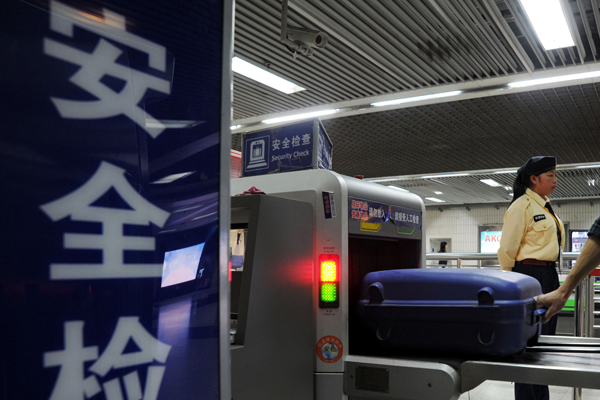 |
|
Passengers say the security checks at Shanghai subway are lax.Niu Yixin / Xinhua |
"It's far short of what they are capable of doing and should be doing," he said.
Branded as both inconvenient and theatrical by commuters, security checks at Shanghai Metro, which handles 7 million journeys a day, have become the target of much derision in recent years.
On Wednesday netizens reacted angrily to images online of a man sneaking past a turnstile with a replica shotgun at Shangchenglu Station on Line 9. Police said they are still investigating the incident, which occurred at about 8:25 pm on Tuesday.
However, authorities hope to fix the problem with a new Shanghai Rail Traffic Regulation that is being drafted.
Zhang Yan, one of the lawmakers with the Shanghai Municipal People's Congress who will decide on the new rules, said she believes the draft law, if approved, will give the metro's security measures more bite.
One of the improvements, she said, is the introduction of new penalties for passengers and security staff.
"For example, commuters who attempt to avoid baggage checks at station entrances will be barred from traveling on the subway," she said. Inspectors, she added, "will also be punished if they are discovered neglecting their duty".
It is not known whether enforcement of the law will involve undercover supervisors to observe security workers, a practice already employed in Beijing Subway, according to station guards.
Shanghai Metro already prohibits flammable, poisonous or corrosive substances, as well as other dangerous items. Since 2010, X-ray baggage scanners are at each entrance to every station. Inspectors check baggage using handheld scanners.
Yet Brian Glucroft, of the United States, who has been living in Shanghai for the past four years, said he does not think the existing security measures are useful, and branded them security theater, giving the illusion of safety but doing little to prevent dangerous incidents.
"So many people blatantly ignore it (the bag check)," he said. "Security guards typically react in no way other than to signal to the next person (in line)."
Zhao Yiqun has been working as an inspector at South Huangpi Road Station since 2010. He confirmed most commuters regularly refuse to scan their baggage at the security checks, especially women with brand-name handbags.
He said about half of the metro's passengers willingly scan their bags, but after 30 minutes observation by China Daily reporters on a weekday lunchtime, only 10 percent allowed their bags to be scanned. Less than 25 percent allowed their bags to be scanned at the city's busiest station at People's Square.
By contrast, workers for Beijing's subway network, which handles 10 million journeys a day, said people are largely compliant, while authorities have placed a greater emphasis on enforcement since X-ray scanners were introduced ahead of the 2008 Olympic Games.
Recently, the capital imposed a rule that passengers must sample drinks before entering a station.
Zhang Fuying, a security guard at Huixinxijie Nankou Station, said she had to complete a week of training, an internship at a station and an exam in order to get her job.
"The instructors tell us not to just stare at the screen, but also pay attention to the passengers' faces, because if someone is carrying a forbidden objects they will be nervous when passing security," said the 20-year-old, who works alongside five guards and three police officers.
According to Beijing Subway's operators, as of March it had 6,700 personnel manning 500 security checkpoints at 230 stations.
In Shanghai, however, there is considerable debate over the effectiveness of the security checks. Some lawmakers want to improve them while others want to scrap them altogether and replace X-ray scanners with random spot checks and police sniffer dogs.
"Inspectors with handheld scanners and dogs can effectively stop flammable materials from being brought onto the Metro," said Wu Zhiming, chairman of the Shanghai branch of the Chinese People's Political Consultative Conference.
He said the current system is expensive and involves checking almost 30 percent of the city's population across 300 metro stations every day.
Cities like Tokyo and Moscow have no large-scale security checks on their subways, he argued.
But Zhou Ye, a spokeswoman for Shanghai Public Security Bureau's urban rail and bus department, said it is unlikely that the security checks will be scrapped.
She declined to comment further, only adding that 1,138 prohibited goods have been discovered at Shanghai Metro stations since June 8, including 88 liters of flammable liquids.

 Protests erupt after verdict
Protests erupt after verdict
 Color Run in London promotes healthy living
Color Run in London promotes healthy living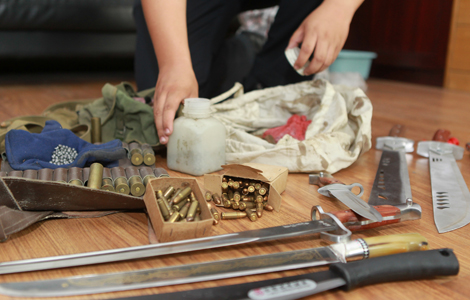
 Urumqi residents hand in weapons
Urumqi residents hand in weapons
 Pool jammed in summer heat
Pool jammed in summer heat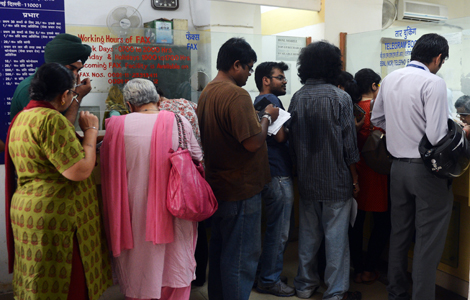
 Last stop for the telegrams of India
Last stop for the telegrams of India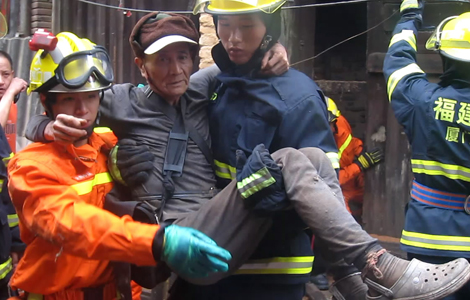
 Heavy rain, strong winds as Soulik heads inland
Heavy rain, strong winds as Soulik heads inland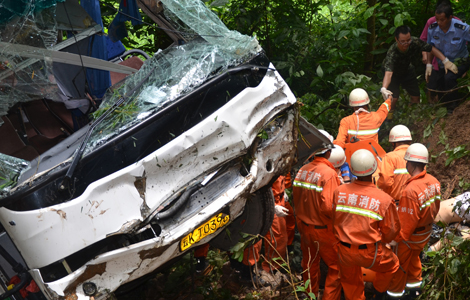
 8 dead, 19 injured after bus leaves road in Jinghong
8 dead, 19 injured after bus leaves road in Jinghong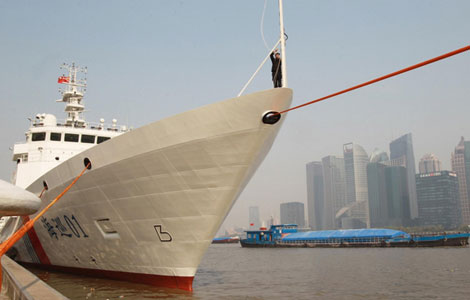
 China's largest salvage vessel visits Indonesia
China's largest salvage vessel visits Indonesia
Most Viewed
Editor's Picks

|

|

|

|

|

|
Today's Top News
Snowden says he won't release harmful US data
Local governments face financing woes
Zimmerman not guilty
More foreign firms in IPR cases
Urumqi residents hand in weapons
Largest vessel visits Indonesia
HK to lift controls on baby formula
Typhoon Soulik kills 3 in S China
US Weekly

|

|






